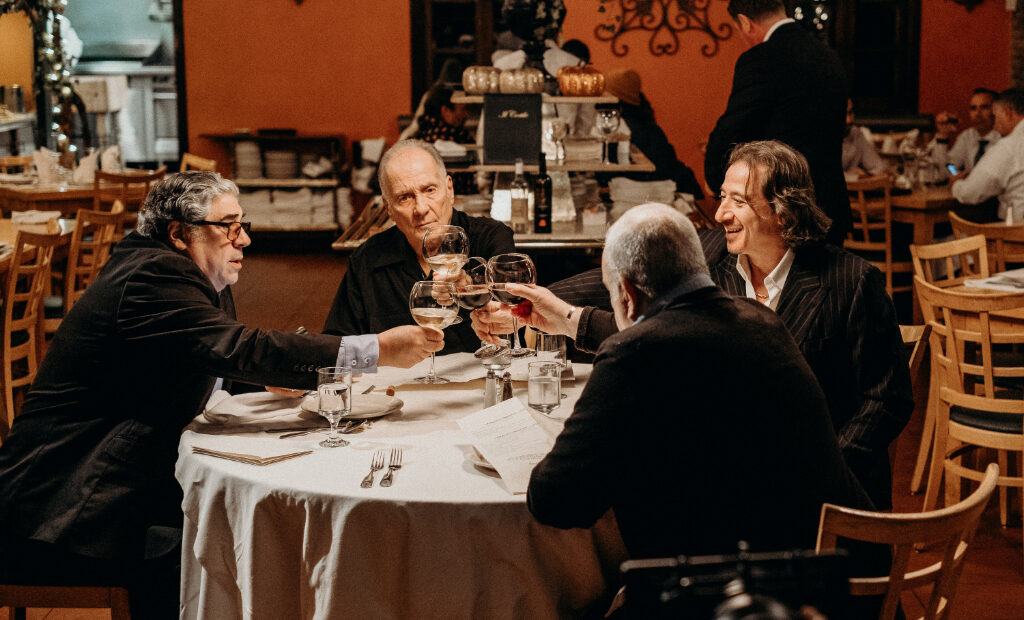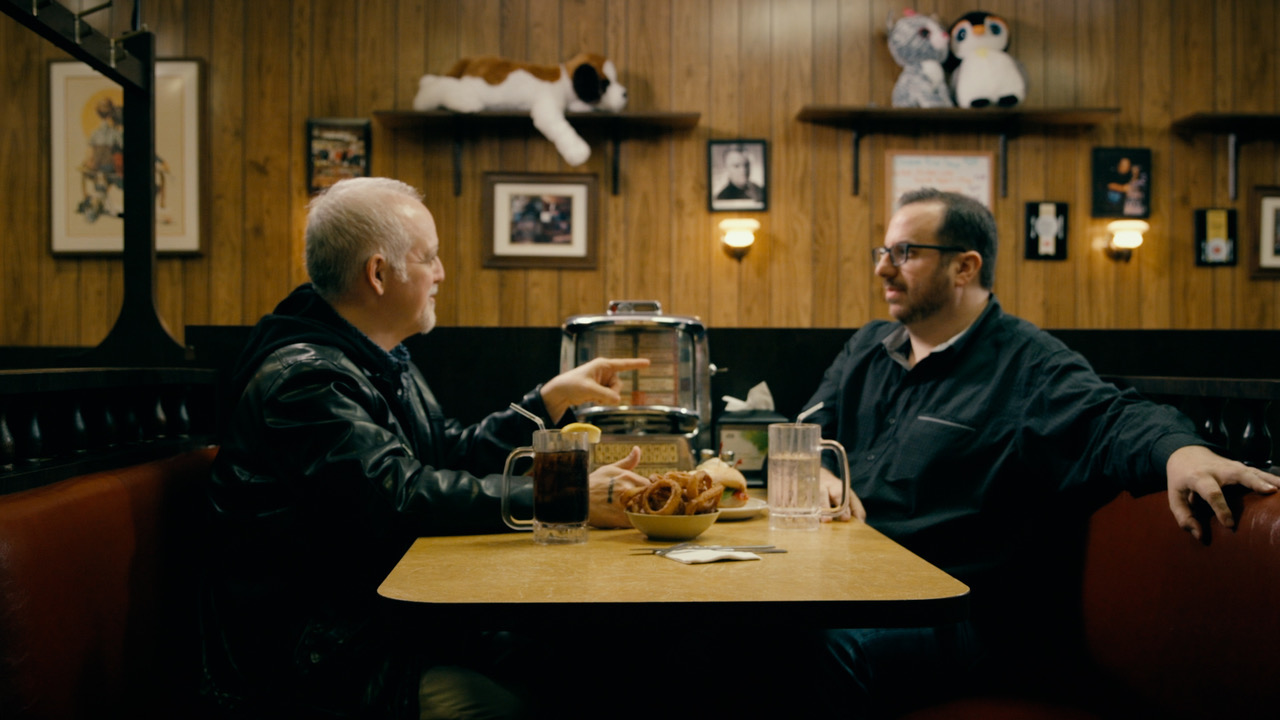It is by now a cliché observation that American TV drama maps cleanly into eras of pre- and post-Sopranos, but the march of history hasn’t made it any less true. The David Chase-created mob saga wove together myriad artistically promising yet relatively unexplored threads in serialized television––continuity-heavy storytelling, a cinematic visual and editing style, nuanced character acting, morally questionable protagonists, layered subtext and symbolism, a showrunner acting as executive auteur––and the results rattled turn-of-the-century pop culture and planted a stake in the history of the medium, Citizen Kane style, such that there is now and forever will be Before and After.
Less talked about than the effect of The Sopranos on its own medium is the way in which its monumental success triggered a parallel evolution in the format of TV criticism. Of course it existed prior to The Sopranos’ debut in 1999, but––much like TV itself––it was largely regarded as a trite and vulgar art, the domain of tucked-away print columns and hack writers, cinema’s bastard child. The really exciting conversation about ambitious TV of the 90s––Twin Peaks, The X-Files, NYPD Blue, The Simpsons––was taking place away from the oversight of “respectable” print publications, in the uncharted online wilderness of BBS fan groups. There, fanatical viewers armed with a VCR and a keyboard would convene to exhaustively dissect and analyze every frame and syllable of their favorite show’s newest episodes, trading complex theories and dissertation-length writeups on everything from alleged foreshadowing to inside jokes to oblique symbolism present in dense programs that seemed to reward the commitment. “Criticism” in this environment was not a dictation from ordained experts to the general public on art objects constrained in place and time, but an ever-evolving community dialectic surrounding an ongoing, shared experience beamed straight into millions of homes and potentially reviewable at the audience’s leisure (at least until one’s last videocassette got taped over).
With the juggernaut impact and New Jersey-centric cultural clout of The Sopranos, young writers Matt Zoller Seitz and Alan Sepinwall of NJ’s Star-Ledger helped usher in a new form of TV criticism, one that bridged the gap between the formal conventions of publication-based film criticism and the anarchic, ever-churning dialogue of BBS culture in which they discovered their passion for the medium. Using the format of weekly recaps and episode write-ups for the show that every New Jerseyan was watching, Seitz and Sepinwall were able to unite casual viewers and wired fans in dissecting and appraising the series bit by painstaking bit. With simple, accessible prose that made no attempt to tamp down their giddy fanboy enthusiasm, they combined the populist review format of motley observations, personal reactions, and cultish theorizing about each new episode with more formal artistic analysis of the show’s themes, construction and style––all avenues for which The Sopranos, an unprecedentedly rich and intimate TV text, could provide in spades. The weekly format also allowed their writing to take on the dialectical living-text quality of the bulletin boards as they responded to other critics, readers, and each other in not-quite-real time––without the pressure to condense their thoughts into instantaneously tweetable nuggets. As their favorite show set the standard for the next two decades of American television, Seitz and Sepinwall’s writing crafted the new face of TV criticism in an age when newspapers and blogs existed side-by-side, and television unequivocally mattered.
Given both the animated, dialectical style into which Seitz and Sepinwall remodeled their medium and the frequency with which appetizing-looking meals are consumed on The Sopranos, it’s fitting that the two critics should frame the short documentary about working on their latest Sopranos-centric book as a conversation over dinner, with a title cheekily referencing Louis Malle: My Dinner with Alan. Sitting down last year at the real-life Holsten’s diner in Bloomfield, NJ––where the infamous, endlessly analyzed cut-to-black final scene of the show was filmed––the two writers jovially discuss their shared history with the series, its cast and crew, and the career of criticism in a new 55-minute feature from director Kristian Fraga intended to promote their 2019 book, The Sopranos Sessions.
In case the choice of venue wasn’t a tipoff, it should be noted that this discussion is strictly a fans-only affair: if you haven’t seen each and every episode of the show (preferably more than once) prepare to be both spoiled and lost as Seitz and Sepinwall rattle off plot and episode details with intimate familiarity over a basket of onion rings. To the initiated, though, it’s something akin to a oneshot podcast or DVD special feature. There’s no particular structure or thesis, nor anything startlingly new you’re likely to learn about the series––that kind of juicy info is conspicuously saved for the book––but the “hangout factor” of watching two lifetime superfans yak emphatically about their object of admiration is a tasty flavor of seasonal fanservice, if you have anything resembling their level of topical enthusiasm.
Perhaps more interesting than discussions about favorite episodes or anecdotes about meeting the late, great James Gandolfini––entertaining as those are––is when Seitz and Sepinwall get ponderous about the role of criticism and where precisely their medium stands in the age of Netflix and Twitter. The digital revolution has rapidly accelerated the pace of content consumption and communal dialogue over two decades: streaming giants dump entire seasons of programming at once for asymmetrical “binge” consumption, and the ecosystem of critical “takes” on Twitter and elsewhere has a turnaround time of mere days, or even hours. Critics, to loosely paraphrase Sepinwall, are tasked with expertly mirroring an audience’s experience back at them; to help reflect on and recognize sensations we were only vaguely aware of having, and suggest new avenues of thought and experience stemming from that. With TV increasingly consumed in binges, and the critic’s role ceded to the economy of the “hot take” via tweet or YouTube/podcast ramble, is long-form written critique ultimately a relic of a bygone era? Seitz and Sepinwall don’t dwell on this question long enough to become morose, but their open-ended concerns dovetail with questions about the cultural longevity of The Sopranos that get picked up again later on.
Two additional segments are included in this streaming release, almost tripling the length of the initial documentary: a sitdown dinner for several supporting cast members from the show, and an interview between the two critics and Sopranos creator David Chase himself. The first gets together actors Vincent Pastore (Sal “Big Pussy” Bonpansiero), Vincent Curatola (“Johnny Sack”), Federico Castelluccio (Furio Giunta), and Arthur J. Nascarella (Carlo Gervasi) for a raucous pre-COVID feast in Little Italy, where wine-enhanced candid conversation quickly turns from genial work anecdotes to griping about residuals and contract disputes with HBO. (You definitely won’t find this stuff on any official HBO release.)

More interesting is the Chase interview, conducted last year as he supervised finishing touches on the delayed-to-2021 Sopranos prequel film, The Many Saints of Newark. For a man who exerted unprecedented authorial control over the production of a serialized television show and demonstrates rare genius in self-expression through characters and dialogue and metaphor, the 74-year-old Chase is disarmingly shy and self-effacing when asked to speak as himself. With doleful eyes sagging bruiselike bags over his cavernous C-shaped cheekbones, he appears almost like a ghostly expressionist sketch or a moody Looney Toon as he meditates his way through the interview with a lack of outward-facing ego that is thoroughly foreign to his profession. Perhaps he is made uncomfortable in daylight by the presence of two highly expressive men who so obviously revere him––Seitz and Sepinwall’s anecdotes elsewhere about production parties suggest an individual who, given a semi-anonymous crowd and a little help from alcohol, is a great deal more forthcoming. Here, Chase mumblingly discusses his trajectory as an artist and shares some striking details about his initial conception of the show that made him famous: that he chose not to pursue his original “mobster in therapy” pitch as a feature because it would have restricted him from exploring the characters’ domestic lives, a choice which would make history by highlighting the expansive literary scope of TV storytelling unavailable to cinema; and that he initially imagined the show’s tone as that of a satirical “live-action Simpsons,” an idea which changed dramatically after he was moved by Gandolfini’s raw, humane performance as Tony.
Eventually, the dinner conversations and musings with Chase converge around the topic of The Sopranos’ generational legacy. Chase speculates that, decades and generations on, the content of the show will seem “dated” to younger viewers; he already seems startled to learn that the show is still talked about. (“Who talks about what was on TV in 1952?” he asks, just moments after praising the genius of Rod Serling and The Twilight Zone.) What he and even Seitz and Sepinwall seem to overlook is that the very “dated” qualities of the series are precisely what will preserve it. What was once a contemporary tableau is now a meticulous period piece: awash in cultural references and an acute generational consciousness, few works of popular art have so comprehensively yet precisely elicited the feeling of middle-class American life at the turn of the 21st century, from the psychotherapy boom to the domestic marvel of purchasing a DVD player to the collective existential crisis of life after 9/11. As Tony Soprano compulsively watches the History Channel (pre-Ancient Aliens) to feel connected to his parents’ generation, millennials and “zoomers” coming into their own maturity now watch Tony to gain some understanding of the generational consciousness in which their own parents raised them. Furthermore, the show’s musings about mental illness, post-immigrant identity, and schizophrenic life under late capitalism have only become more relevant to generations for whom such seemingly abstract concerns are an overwhelmingly oppressive reality; and two decades of gritty cable dramas have only proven that the vivid, complex personalities and riotous dark humor with which The Sopranos characterizes its sprawling cast are rare qualities indeed. For all that writers like Seitz and Sepinwall have plumbed this work’s myriad meanings, the passage of time will only reveal new layers to explore.
My Dinner With Alan: A Sopranos Session opens in the U.S. on May 19, 2021 and expands through June. See theater locations here.

